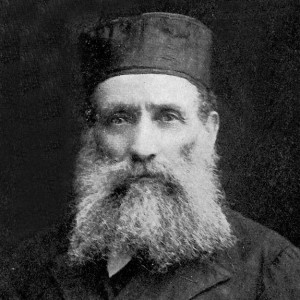Millie Cantor
April 13, 1920 – May 12, 2008

The Funeral Service
- Eulogy by Daniel Cantor
- Poem by Madeline Cantor
- Millie the Muse by Phil Cantor
- A Few Words by Carrie Cantor
- Eulogy by Steve Cantor
- Listen to the entire service
- Photo album (requires Flash)
In the mail
On the Internet
Eulogy by Daniel Cantor
May 16th, 2008
Millie Cantor was born Mildred Block, on April 13, 1920. She was the daughter of Tessie and Isidor Block, and the middle child between her older sister, Edie and her younger brother, Jack. The family’s story is a familiar one, but no less cherished for being so. Both parents were Jewish immigrants, Tessie from Slutsk, near Minsk , Isidor from Lithuania. There were many relatives, and the importance of family ties was established early in her life.
Her childhood was not easy. Her father committed suicide when she was only five years old, a death that must have hung over her all her life. It left her mother — the indomitable Tessie, whose namesake great-grandchild is here today — to raise the family in circumstances that can only be described as dire. They were poor, of course, but no poorer than most of the people they knew. There was a brief interlude of financial progress when the family headed towards the middle-class, but it soon collapsed. Whether from the experience of everyday life or the ideological atmosphere, Millie and her siblings, like so many others, were firm believers in social and economic justice, and they were committed Roosevelt Democrats. These early values stuck with her throughout her life.
It was in these years – the late 1920s and early 1930s, that she discovered her first true love: books. It was a lifetime love affair. She told me that once she started reading a book, she felt an obligation to read it all the way through. “If the author took the trouble to write it, the least I can do is finish it.” That’s a good reader.
No doubt as a result of all this reading she was an excellent student. She attended John Dewey Junior High School and New Utrecht High School in Brooklyn, finishing at age 16 and moving on to Brooklyn College . Living at home, she commuted to the college, majoring first in chemistry and later switching to speech – literature in today’s world. She wrote her senior paper on Virginia Woolf and long have we wished we could find it. In 1941 she graduated: a serious, capable, intelligent, progressive young woman in an era when there were not so many avenues open for such. No doubt she wanted a room of her own.
World events intervened, of course, and with the US entry into World War II, Millie joined the defense effort. She got a job working for something called the British Purchasing Agency, but did not stay long there as she was soon hired away by the U.S. Army’s Signal Corps Labs. “They wanted girls with some college math,” she told us, and so she found her way to Fort Monmouth , New Jersey to a house full of young Jewish women, all of them working in defense plants, all of them away from home for the first time. They were heady and exciting years. Millie was 22 years old.
She soon met Herb Cantor – 7 years her senior – at a folk dancing class near the base. She once told me that she knew right away that she had met “an unusually nice fella.” Which he was. Herb soon shipped out to the Asian theater but they had time enough to fall in love, and a few months ago Millie even allowed that they had spent one forbidden weekend together in New York City , not visiting a single relative. I was glad to learn this.
The war years passed quickly. They were actually good years for Millie, as her granddaughter Tess discovered when interviewing her for a school project. “What about the privations and rationing of the war, Grandma?” “Tess, honey, it was a ball.” And so it was for a young woman about to embark on the long second act of her life.
Herb returned from China late in December 1945, and Millie and he married a few weeks later. They moved to Long Beach where she worked as a librarian, and in 1948 they moved to Levittown . She was an original Levittowner, and was always proud to be a member of that brigade. Mady commented the other day to Phil and me about the amazing intelligence and dedication and energy of the women who made communities out of these brand-new, barely finished neighborhoods that had been potato fields a few months earlier. Millie was among them, raising a family, building a community.
There was the babysitting co-op and the embroidery group and the neighborhood ballroom dancing classes and the Better Education League and the typing classes for the kids. We literally carried picnic benches to the sidewalk, put our typewriters on them, and sat in folding chairs while the neighborhood typing teacher told us what to do. I know that many historians and sociologists have described the decline in community spirit and voluntarism in these last decades in America , and no doubt they are right. There’s a famous book on this topic called “Bowling Alone.” As my sister pointed out, Millie never bowled alone. Of course, she never actually bowled, but you take the point.
This devotion to community and the public good was unusually clear in one aspect: the public library. There was no library when Millie arrived in Levittown , and among her life’s great accomplishments was the establishment of the Levittown Public Library. In the 1950s she was the president of Friends of the Library, and she ended up serving nearly 30 years on the board, including several terms as president. This was an elective public office, and Millie was not afraid to take on the opposition. Consider this clip from the Levittown Tribune from April 1955.
“Public spirited mothers aren’t exactly a rare thing around here, but Mildred Cantor, wife of Herb Cantor of 78 Sprucewood Drive and President of the Friends of the Levittown Public Library, recently scheduled civic and personal duties almost too close for comfort.
Millie got together with other Friends, on Tuesday the 12th, to go over the copy for a letter opposing the “Abolish the Library” proposition, to be written over her signature as President. Not until the letter was in the best possible shape did she relax enough to realize that maybe the letter was, but she wasn’t!
On Wednesday the 13th, with the letter copy in the works, Millie hied herself to the hospital and gave birth to Daniel Edward Cantor, 6 pound, 15-ounce, baby brother of Madeline and Philip.
You’ll note that the date of Daniel’s birthday – April 13th – is the same as Millie’s. That was Millie, having a baby, and fighting the good fight with a pen and paper. Of course it wasn’t all selflessness: she enjoyed being in charge of things and wielding power. One of the pleasures we took as children came from the one perk that accrued to Library Board Trustees — namely the ability to return books late and not pay a fine. We would walk up to the women at the checkout desk and say: “We’re Millie Cantor’s children”, and they would smile and give us a big wink. Of course, Millie being Millie, we were almost never late in returning our books, but it was nice to have a backup plan.
Truth be told, her love of the library was partly from her love of words and language and books, and partly from thriftiness. She was of the generation that saved more than they spent. And this led her to her outspoken dislike of bookstores – she considered them a private answer to a public need. It’s an aside, but I have often thought that the perfect logo for the Working Families Party would be a Public Library building, as what else so instantly captures a civilization’s advance. Plus it would remind me of her.
I don’t want to leave the impression that Millie lived just in the world of books. She was as practical as she was intelligent. She was an accomplished craftswoman, serving as a Judge for Crafts at the Nassau County Fair, and was an expert knitter, embroiderer, weaver and all-around fix-it-yourself-er. She gave lectures on knitting, and turnout was good. She combined her love of good craftsmanship with her social agenda when she got involved in Master Crafters, a nonprofit consignment shop for older artisans. Master Crafters provided a market for their work via the store that Millie and others managed, and it gave her great pleasure to know that not only were these crafts people keeping busy, they were also making a little money. Some of them sorely needed it.
Throughout these decades, Millie’s lively mind and active hands were matched with a big heart. She loved her family fiercely, but not exclusively. I am certain that the Apa kids, or the Hirsch kids, or the Lebwohl kids, or any of the many visitors and friends we brought to the house over the years would agree that she was a warm, interesting and interested-in-them woman. She had a wall in her house against which we measured all the visitors, writing their names, hometowns and dates — in ink — on the wall. It was a giant “welcome” sign, and repeat visitors always checked for the earlier signatures, even after they stopped growing.
I know much less about my mother’s life after I left home, but I do know that she and Herb kept busy. Trips to California to visit Edie and Jack. Meetings of the Cantor Family Society, which Millie served as secretary. We kids saw her with reasonable frequency, but now it doesn’t feel like enough. Mom was a great cook, and family gatherings through the 70s and 80s and 90s were always lively and delicious affairs, especially when we started showing up with spouses. I think — make that I know — that Millie was ecstatic when her semi-accomplished children actually started to get married and began procreating in the late ‘80s. You might say that Act III began with the arrival of the grandchildren, led by Max, and followed by Nate, Tess, Eli , Ethan and Alice. Each child filled her with enormous joy, and she bragged about them whenever appropriate — which she thought was basically always. She loved her children’s spouses, and bragged about Carrie and Arthur and Laura nearly as frequently as the grandchildren.
Mady’s husband, Arthur, deserves special mention. Millie deeply adored him, and with good reason. I want to publicly thank him — Phil and I want to publicly thank him – for his devotion to Millie over the last 30 years, but especially these last years in Philadelphia. It was like she had a third son.
After Herb died Millie’s life narrowed. She had wonderful friends in Levittown and Wantagh , some of whom, happily, are with us today, but life got lonelier. She continued her close-to-annual trips to California to visit her beloved brother Jack and her nephews and nieces. And she continued to be active in the Family Society and to read and knit as much as her eyesight would permit.
In 2005 she sold the Levitt house. I joked that that she’d finally had enough of the interviews with the Ph.D. candidates, journalists, sociologists and filmmakers who somehow ended up at her kitchen table wanting to learn about the history of early Levittown . I’m guessing there were at least two dozen such interviews over the years. The matching chairs where she and Herb read decades of New York Times’ and New Yorkers were given away, and Millie spent her final 2 ½ years at Cathedral Village, close to Mady and her family.
She did okay there, but she missed her old home and her old friends and, of course, her husband. Plus the food, she said, “was a little bland.” Millie had a sensuous relationship with food, and knew how to savor a good meal. She also was ever-willing to send something back into the kitchen at a restaurant, which filled her children with dread.
She got sick just a month ago. It was just a week after Alice became a Bat Mitzvah. In fact, it was on Millie’s birthday – our birthday – that she started feeling poorly, and here we are. It has been a powerful few weeks. She knew what was happening. At the end of the long family meeting with the doctor who gave her the grim diagnosis, the doctor finished up by saying: “Mildred, I’m very pleased to have met you.” Millie didn’t hesitate: “Well, I can’t really say the same about you.” The five of us left and went out to have Chinese Food.
She kept her wits about her to the very end, even as the pain medication made her terribly groggy. We were talking to her a few days before her death, and I said something about how Philip, Mady and me – and her eyes popped open, she smiled and said, “Philip, Mady and I…” All four of us had a good laugh. She liked to laugh, and in this regard she married well.
At Alice ’s Bat Mitvah, Alice and Doug sang a song that the three Cotler brothers — Millie’s nephews — wrote. It’s called “Standing on the Shoulders” and it had been rattling around in my mind since the event. On my last visit with Millie, just hours before she died, I said to her: “Mom, I just want to thank you and Dad for letting us stand on your shoulders, for all that you did for us.”
I know that I speak for my brother Phil and my sister Mady when I say that we are still standing on her shoulders, and that we are so very proud to be Millie Cantor’s children.
Poem
by Madeline Cantor
About eight years ago I choreographed a dance on the unlikely subject of food. I called it “Queen Garlic” and dedicated it to my mother on the occasion of her 80th birthday. The whole thing started with a dance done to a poem I wrote. The poem was about food as celebration, food as pleasure, food as connection, food as a metaphor for many of the good things in life. I had my mother clearly in mind when I wrote it, and here it is.
Cinnamon Toast
Well, there’s cinnamon toast,
And then there’s Daddy Toast,
which is cinnamon toast that goes under the broiler
Just till the sugar bubbles.
There’s English muffins with their nooks and crannies,
hills and valleys,
covered with cream cheese and scallions
And a little of last night’s wilted salad.
What about grilled cheese cut corner to corner
With some of its sharp cheddar innards oozing out
Or an orange that practically jumps out of its skin
With a burst of sharp tang.
And pasta with pesto, and pesto with pasta,
And pasta with pesto, and pesto with pasta,
just before 12, night after night after night
Or a cherry tomato in August that is so sweet
It can’t decide if it’s a fruit or a vegetable or a dessert.
And rice, oh rice,
Steamed pure
Or sautéed with some friends
Or all dressed up for the evening.
And then there’s my mother’s sweet and sour cabbage soup
And cucumber salad
And roasted peppers
And pencil-thin asparagus…
All hail Queen Garlic and her consort King Onion
And their savory children and grandchildren.
Let us celebrate the potato in all its mutable glory,
Prince of adaptation, gracious host to salt.
And a big bowl of multi-hued lettuce,
None of it iceberg,
With radish dimes hidden in it
Glistening with vinaigrette.
Oh the sticky pleasures of baklava
And the oily delights of dim sum
And the satin pillowcases of perogies
How will I live long enough to eat it all?
Let’s get to work.
Millie the Muse
by Phil Cantor
Millie Cantor was a wonderful combination of brilliance and practicality.
She was a great supporter of the arts. In particular, she was a supporter of one photographer specifically. She was my collaborator and muse. On the slide show in the lobby, you’ve seen some of the photographs we made together.
In the early 1970s she allowed me to dress the whole family in black turtlenecks and to sit for a 5 second long exposure to make a very dramatic, rock and roll style family portrait, reminiscent of a Beatle’s album cover.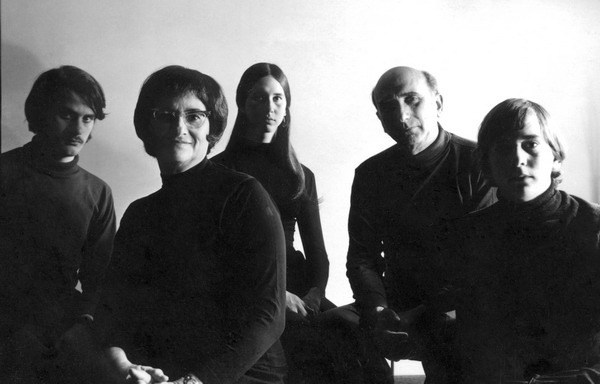 Then, in our most memorable collaboration, we set up a card table deep in the California woods where she played a forlorn saleslady vainly trying to sell pine cones for 50 cents while surrounded by a forest floor littered with hundreds of pine cones.
Then, in our most memorable collaboration, we set up a card table deep in the California woods where she played a forlorn saleslady vainly trying to sell pine cones for 50 cents while surrounded by a forest floor littered with hundreds of pine cones.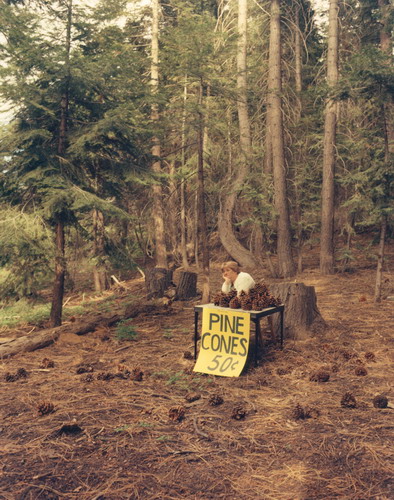 In the 90s, while visiting Montclair , we made a portrait together where she transformed a red t-shirt and a piece of black fabric into a Gloria Swanson Hollywood glamour shot.
In the 90s, while visiting Montclair , we made a portrait together where she transformed a red t-shirt and a piece of black fabric into a Gloria Swanson Hollywood glamour shot.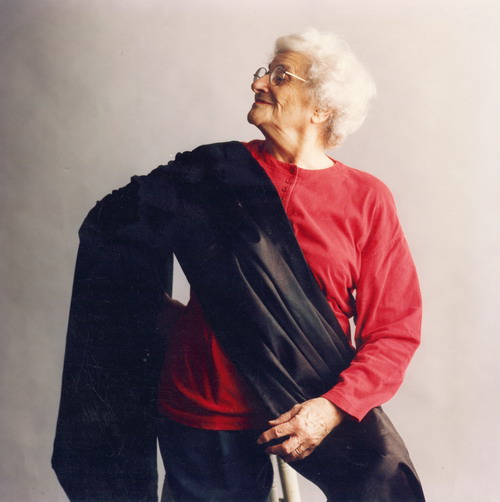 Two and a half weeks ago, confined to a wheelchair, we rolled around IKEA (it was an outing chosen for its Swedish meatballs), and she thoroughly enjoyed letting me insert her and her wheelchair in amongst the gazillion tables, desks and shelves we found in the store. She posed, with her beret stylishly tilted to one side, in a long line of empty IKEA chairs, giving the camera a very haughty “what are you staring at” look.
Two and a half weeks ago, confined to a wheelchair, we rolled around IKEA (it was an outing chosen for its Swedish meatballs), and she thoroughly enjoyed letting me insert her and her wheelchair in amongst the gazillion tables, desks and shelves we found in the store. She posed, with her beret stylishly tilted to one side, in a long line of empty IKEA chairs, giving the camera a very haughty “what are you staring at” look.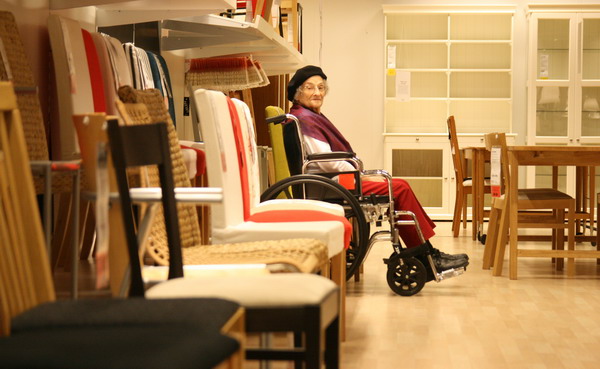 And, this is my fave. We met in the city, after Herb died, to visit a museum. Afterwards, we found a café and I made this portrait, She is, as always, simply and elegantly dressed. She is leaning slightly forward, engaging the camera (and the viewer) directly, frankly, warmly, and with an intelligent twinkle in her eyes.
And, this is my fave. We met in the city, after Herb died, to visit a museum. Afterwards, we found a café and I made this portrait, She is, as always, simply and elegantly dressed. She is leaning slightly forward, engaging the camera (and the viewer) directly, frankly, warmly, and with an intelligent twinkle in her eyes.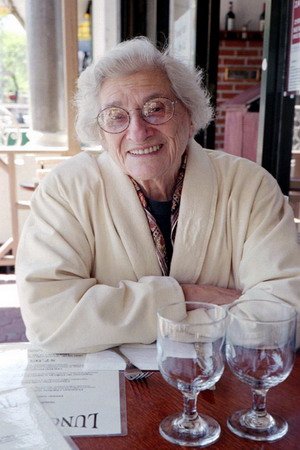
A Few Words About Millie
by Carrie Cantor
Like all of us here, I grew up hearing jokes about mothers-in-law. The mother-in-law, especially the Jewish kind, is supposed to make life miserable for whoever marries her precious son.
Well, when I got married and acquired a Jewish mother-in-law, it was my great fortune for it to be Millie. I do have to say that in one of my very first experiences with her, I got a taste of her often, but not always, endearing “tell-it-like-it-is” style. At the time I was an editor for a newsletter that covered the international oil industry. She quizzed me for several minutes to find out exactly I did there, and after she’d heard what she needed to hear in order to come to a conclusion about the whole thing, she opined: “That must be dull as dishwater.” But it was all roses after that. (P.S. – I left that job a year later, and changed careers, and yes, it was dull as dishwater.)
She was a dream mother-in-law. Always helpful, nurturing, respectful, and most of all, loving. She knew she had raised sensible children and that those sensible children had the good judgment to pick sensible spouses. She showed all of us nothing but support, trust, and love.
While I, of course, have many, many memories of Millie accumulated over the years, some stand out. One in particular was when I was in my first trimester pregnant with Ethan. I felt nauseated all the time, and food preparation was a challenge–yet I so needed to eat to settle my stomach. Food preparation was not Phil’s forte, at that time. Well, one day Millie came over, and made me a nice, bland, delicious, nutritious chicken sandwich, and I remember feeling so well taken care of and so glad that she was there.
I also remember so well how wonderful she was with my boys, especially when they were little and at a stage in which the details of life that adults take for granted are so fascinating. Millie seemed to really “get” that fascination and knew just how to feed it. She would let them mix things, wash things in her sink, take apart things, pour things into other things. She would cook with them, sew with them, knit with them. It was called Camp Grandma , and it was delightful, for them and for her.
Millie was a force and a personality to be reckoned with. She was the most organized person I’ve ever known. She didn’t suffer fools gladly, and she often said she enjoyed her own company. She was a woman who knew what she liked and what she wanted. Suffice it to say that restaurant owners quaked in their boots when they saw her coming.
She was also competent and knowledgeable about all kinds of things. I anticipate that as life unfolds from here forth, many “Let’s ask Millie” moments will arise that will make us feel her loss all over again. Such as when we want to know how to get a stain out of something, or especially if we wonder if some famous person might be half Jewish.
I recently came across this quote from Winston Churchill and it made me think of Millie: “I am ready to meet my Maker. Whether my Maker is prepared for the great ordeal of meeting me is another matter.” I would imagine her somewhere in heaven right now telling the celestial chef that the food is just a little too salty or needs extra vinegar. Yes, Millie always wanted things just so, and wasn’t shy about identifying and then taking action to do whatever things big or small needed to be done. In her life, she was surrounded by things that she created and people she nurtured. She lived life fully and went out tasting caviar surrounded by her loved ones. My hat is off to her and I will never forget her. And I’m so glad that her genes live in my children.
Millie’s Eulogy
by Steve Cotler, a nephew
To three little boys growing up in California, Aunt Millie and Levittown were always part of our family. In the late 40s and early 50s, when long distance telephone calls were an expensive luxury, the importance, the constancy of the close, warm relationship between my mother and her sister was reinforced by stories, snapshots, and the occasional cross-country train ride. Stories of family…always stories of family…anecdotes told with warmth and humor about interesting, important people
- important because they were family
- important because they had character or were characters
- important because they were from Brooklyn, home of my beloved Dodgers.
Because of that close sisterly connection, Aunt Millie was the most important of these people. My older brother Lanny remembers at age 5 being at Millie and Herb’s wedding in 1946. He remembers the color of Millie’s dress. I don’t. I do, however, remember precisely where I was when my mother told me of Millie’s stillborn first child. That was my first impression of death.
Millie was ever-present in our home. Because I was convinced that my Aunt Millie was the woman on the SunMaid box holding the basket of raisins, she sat prominently at our little-boys’ breakfast table. Because Millie and Edie’s mother, my grandmother, known in the early days of air travel as Trancontinental Tessie, alternated living at our two homes, Herb and Millie’s growing family was described with affection and lots of superlatives.
As I got older, I began to see differences between our two households. In Levittown, Millie and Herb’s morning tableau included ritual readings from the New York Times. In Oxnard, the Press-Courier was an excellent beginning to any papier-mâché project. The humor in my home was extended storytelling with Yiddish accents and Borscht Belt punch lines. In Levittown, it was Uncle Herb’s sly one-liners and unexpected winks. My house was seemingly ever on the edge of what we called adventure, but was probably chaos. There was a lot less yelling in Levittown.
I saw Aunt Millie as organized, efficient, and completely in control. She had unbelievable retrieval of an impressive inventory. If a hard line drive just ripped through the webbing of your favorite glove and you needed a piece of rawhide cord for repair, Aunt Millie would ask how thick and what color …and then she’d go right to the box in the garage. Imagine how much better Washington would have functioned with Millie as a Cabinet Secretary…Defense or Agriculture, probably not. Better Education or Health and Human Services.
Some family lessons are easier to learn when they come from outside your own home, when they are taught by aunts and uncles. By watching how Millie loved and honored her mother, I learned how to love and honor mine. By watching how she loved and honored her children, I learned how to love and honor mine.
From Aunt Millie I got advice. I didn’t always ask for it. I didn’t always take it. But I was always aware that it was probably right.
Sprucewood Drive was always open to me. When I was sent home with mononucleosis from a camp counselor’s job in Maine in the summer after my freshman year, Millie took me in and nursed me. After my divorce, when I would come East to be with my young daughters, Millie was an additional, unconditionally loving grandmother to them, and her home with its dress-up box of clothes was where they frolicked and I healed.
She held me in her arms when I was little and held me in her heart every day she was alive. She was my favorite aunt.
I will hold her in my heart forever.
Irrepressible Tomato
by Michael Berkowitz
that irrepressible tomato
so thickly sliced and juicy
oozed love all over a shmeer of cream cheese,
painted with a palette knife, making a canvas
of her pumpernickel
Millie’s simple garden grew such things
it was an amazing garden
where books grew
like daffodils
and daffy definitions sprouted
in her Herb garden
children grew there,
danced there, too
planted with ideas and aspirations,
creativity and laughter that slowly melted
like her sweet swirly berry ice cream
if there ever were gardens
whose scents and sensibilities
flourish in my memories
it was those two
I was one of the lucky few
to have wandered there
those backyard summers
of perpetual dreaming and
adolescent insensitivity
I have been to many beautiful gardens
but none where I have flourished amongst its flowers.
I admire their arrangements, orchids and such,
but that long-ago laughter is missing,
and I wander lonely through them.
I have seen paintings by Monet of his gardens.
I have never been there, but I would surely sacrifice
that tourist’s pleasure
if for just one sliver of a second I could be transported back
to Millie’s and her Herb garden,
and laugh together with you
in that summer sunlight.
one last time.
Sprucewood Drive
by Fran Hirsch, a long-time neighbor
It was appropriate that Millie moved to Levittown, the creation of the “builder” that the town was named after, for Millie never did anything that wasn’t “constructive.”
All know the library dedicated a room to her as a founding member, and what’s more important for a community’s citizens to have than a place to teach, learn and exchange ideas and grow.
She was known on Sprucewood Drive as a self-styled welcoming wagon lady to new arrivals and a mentor to all our children who wandered into her kitchen to experience and learn new things, exposed to things they would not otherwise have been introduced to.
Her knowledge was vast, her common sense grounded, her value system one to be admired and adopted. Add to this, she honed her skills in cooking and crafts. She could whip up a to-die-for lemon cake, or a practical zip-up-the-back baby sweater, among many other things.
She had humor and grace, could be quite the diplomat, and occasionally an irritant.
Most of all, I admired her brain, her willingness to share, and the place she chose to reside in in the world community.
Newsday obituary
by Carl MacGowan May 15, 2008
Mildred Cantor, an early resident of Levittown and a founder of the community’s public library, died of cancer Monday at her home in Philadelphia. She was 88.
Cantor grew up in Brooklyn, but like many city residents of her era moved to Long Island after World War II. She taught dance, knitted crafts and lobbied for spending more money on public education as Long Island made the transition from farms to suburbs, said her son, Dan Cantor of Brooklyn. “One of the things that makes community life robust is people like Millie Cantor and thousands of others,” he said.
Cantor raised three children in Levittown while helping to form community institutions and establish local traditions, her son said. She was a member of a crafts and knitting group called Master Crafters and judged handiworks at the Nassau County Fair, he said.
Driven by thriftiness and a passion for reading, she helped to found the Levittown Public Library in 1950 and served as president of its board for 30 years, Dan Cantor said. In 1955, he said, his mother joined the fight to defend the library when some residents tried to close it, citing what they viewed as exorbitant costs and books written by leftist authors.
“The library for her was a great symbol of what a community needs to have,” said Cantor, executive director of the state Working Families Party.
Mildred Cantor majored in speech at Brooklyn College, where she graduated in 1941. During World War II, she joined the U.S. Signal Corps to test signal circuits at Fort Monmouth in New Jersey. Dan Cantor said his mother got the job because she had taken math classes in college.
She met Herbert Cantor, an Army serviceman, at a folk dance at Fort Monmouth. They married in January 1946 when he returned home after serving in China, Burma and India. The couple moved to Levittown in 1948. Herbert Cantor ran an auto-parts store in Valley Stream and died in 2000, Dan Cantor said.
Before her children were born, Mildred Cantor worked as a librarian in Long Beach. She organized folk dance lessons in her living room and supported the Better Education League, which advocated for increasing public school budgets, her son said.
In recent years, she was interviewed by students and researchers interested in the early days of Levittown. “She would regale these PhD students,” he said. “She was not famous but a real contributor to community life.”
She moved to Philadelphia in 2005, he said.
Besides her son, Cantor is survived by a brother, Jack, of El Cerrito, Calif.; another son, Phil, of Montclair, N.J.; and a daughter, Madeline Cantor, of Philadelphia.
Funeral services will be Friday, at noon, at I.J. Morris Funeral Home, 46 Greenwich St., Hempstead. Burial will follow at Mount Judah Cemetery in Brooklyn.
LibraryJournal.com
Michael Rogers May 15, 2008
Library Hero Mildred Cantor: RIP
Was breezing through my local paper this morning when spying a lengthy obit for a lady named Mildred Cantor, who passed away at age 88. She was a Long Island librarian who helped found the Levittown Public Library in 1950 and served as the president of its board for 30 years. During that time she successfully suppressed a movement to shutter the library when residents carped over its costs and what some thought were leftists books in its collection.
“The library for her was a great symbol of what a community needs to have,” her son Dan told NY Newsday. Who could argue with that? I know there are some that would, but they’re idiots, so ignore them. Mildred wouldn’t have taken any nonsense from them. Mildred, for that and all your years of library service, LJ salutes you.
